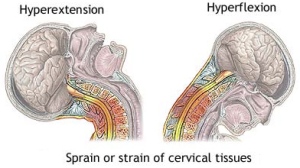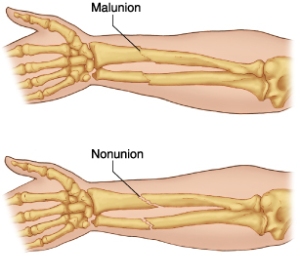While a car accident itself may not be a reason to file a disability claim, many disability claims result from injuries sustained in a crash or other type of accident. While you may not qualify for Social Security Disability Insurance if the injuries don’t totally incapacitate you for more than 12 months, many individual and group long term disability policies cover the inability to work due to these incidents as well as almost all short term disability policies. From back problems to broken bones to “whiplash,” there are many different types of injuries that can result from even seemingly minor vehicle accidents, including some that may not become apparent for an extended period of time. Today’s blog post is going to review some of the different types of injuries that may result from these accidents and how to obtain the disability benefits you deserve while recovering from these injuries.
- Whiplash and chronic neck pain. One of the most common car accident injuries of our clients is whiplash and the ensuing pain it causes. Many sufferers don’t even immediately realize they’ve been injured and are often unaware of the
 accompanying side effects this condition can cause. Although most people recover from whiplash symptoms quickly and with few effects, reports show that 1 in 5 whiplash victims suffer from long term chronic pain with 30% of these cases lasting longer than one year. While many people think of whiplash as just pain in the neck, it’s also been linked to traumatic brain injury and injuries to the spine and spinal cord. Whiplash can also lead to symptoms that range from sleep problems, forgetfulness blurry vision, ringing in the ears, and a debilitating sense of fatigue. These symptoms can make it impossible to work, so preparing and filing a disability clam becomes critical for the unlucky individuals who suffer from these complications. Many claims examiner are trained to be skeptical of people who claim to have whiplash or its complications, as they’re often invisible conditions with few “objective” tests to prove their existence. This is why it’s so important to have appropriate medical documentation to support your claim and prove your conditions when scrutinized by the insurance company. Also, whiplash can manifest or worsen after a diagnosis, so be careful to follow any restrictions prescribed by the treating doctor. Not being careful about following your doctor’s advice can increase your risk of major or longer-lasting complications and may be used by the insurance company to deny your disability claim.
accompanying side effects this condition can cause. Although most people recover from whiplash symptoms quickly and with few effects, reports show that 1 in 5 whiplash victims suffer from long term chronic pain with 30% of these cases lasting longer than one year. While many people think of whiplash as just pain in the neck, it’s also been linked to traumatic brain injury and injuries to the spine and spinal cord. Whiplash can also lead to symptoms that range from sleep problems, forgetfulness blurry vision, ringing in the ears, and a debilitating sense of fatigue. These symptoms can make it impossible to work, so preparing and filing a disability clam becomes critical for the unlucky individuals who suffer from these complications. Many claims examiner are trained to be skeptical of people who claim to have whiplash or its complications, as they’re often invisible conditions with few “objective” tests to prove their existence. This is why it’s so important to have appropriate medical documentation to support your claim and prove your conditions when scrutinized by the insurance company. Also, whiplash can manifest or worsen after a diagnosis, so be careful to follow any restrictions prescribed by the treating doctor. Not being careful about following your doctor’s advice can increase your risk of major or longer-lasting complications and may be used by the insurance company to deny your disability claim. - Back injuries and chronic pain. Much like whiplash and neck injuries, back injuries are not always diagnosed immediately and their onset may not happen until long after the accident. There are three major types of spinal cord injuries that can result from car accidents that can have an effect on your daily life. Cervical vertebrae injuries, or neck injuries share much in common with whiplash injuries described above. Lumbar spine injuries, while not often the most severe, can be very painful due to the physiology their location. The lumbar spine is composed of the five largest and strongest vertebrae, meaning that many sprains or strains can limit movement and cause pain just performing normal activities. Thoracic spine injuries are often the most severe and serious resulting from auto accidents. These involve upper back vertebrae which also connect to ribs and the chest region. Injuries to this area usually result from a high speed collision and may result in permanent, irreversible nerve damage. No mater what part (or parts) of your back is injured, there’s also the chance of disc herniations that can cause sudden, intense pressure and extremity numbness until they’re resolved. Back related claims are an area for which insurance companies have invested in medical consultants as well as training for their claims examiners to try and minimize pain and suffering, having their “experts” say that your conditions are not supported by your medical records and there is no basis for the claimed disability. Make sure you have any and all necessary testing done that can prove your condition and carefully follow the treatment guidelines of your physician, even if you don’t see the immediate progress you’re expecting.
- Broken bones and fracture complications. While not mentioned as often, fractures are prevalent in car accidents. While most fractures heal without any permanent injury, there are many
 complications that can affect a claimant’s ability to work. Immediately after the fracture, there may be soft tissue damage, including ligaments, tendons, muscle and joint damage, that can prevent such tasks as walking or typing without rehabilitation. Within a few days of the fracture, complications can arise, such as as infection, compartment syndrome, blood clots, and adult respiratory distress syndrome. Even progressing through the recovery process, there are still several issues that need to be considered, such as malunion and nonunion of the fracture, nerve damage, and conditions such as Reflex Sympathetic Dystrophy (RSD) and Chronic Regional Pain Syndrome (CRPS). All of these conditions can become major medical complications that can prevent someone from returning to work in the short term, and in severe cases, even the long term. With these types of injuries, some people believe that it’s possible to continue working, albeit at a less strenuous pace. While this may seem like a good idea, reducing your job duties in order to continue working may become a negative when the claims examiner is evaluating your injury to decide if you are still able to perform your duties or can work with reasonable accommodations.
complications that can affect a claimant’s ability to work. Immediately after the fracture, there may be soft tissue damage, including ligaments, tendons, muscle and joint damage, that can prevent such tasks as walking or typing without rehabilitation. Within a few days of the fracture, complications can arise, such as as infection, compartment syndrome, blood clots, and adult respiratory distress syndrome. Even progressing through the recovery process, there are still several issues that need to be considered, such as malunion and nonunion of the fracture, nerve damage, and conditions such as Reflex Sympathetic Dystrophy (RSD) and Chronic Regional Pain Syndrome (CRPS). All of these conditions can become major medical complications that can prevent someone from returning to work in the short term, and in severe cases, even the long term. With these types of injuries, some people believe that it’s possible to continue working, albeit at a less strenuous pace. While this may seem like a good idea, reducing your job duties in order to continue working may become a negative when the claims examiner is evaluating your injury to decide if you are still able to perform your duties or can work with reasonable accommodations. - Post traumatic stress disorder (PTSD), depression, and severe anxiety complications. Car accidents are the leading cause of PTSD in America. The symptoms of this condition can be severe and include re-experiencing the incident, persistent avoidance of the stimuli associated with the trauma, major depression, and phobias. Aside from PTSD, developing an anxiety disorder can go hand-in-hand with PTSD after a crash. Those who have suffered from anxiety attacks can relate to the crippling effects of these episodes and how helpless you feel when experiencing them. However, insurance companies are very good at developing reasons to deny mental and nervous disability claims. They have “experts” on their payroll who will find reasons to question your disability and will delay or deny your benefits while you fight their assertions. It’s important to see a specialist for your condition regularly and have documented proof of everything that limits or restricts you from working. Some people find these conditions embarrassing and try to keep their feelings and emotions secret. but this can harm not just your health but also your claim for disability benefits.
A car accident can cause many overwhelming stresses in your life without having to worry about disability insurance. You have to deal with medical bills, car repairs, police reports, and possibly lawsuits resulting from a collision. Having to add the struggle of trying to document and be approved for your disability insurance benefits on top of everything else is a terrible situation to face. If you would like more information about your specific disability claim or know someone who needs help, please call our offices toll-free at (855) 828-4100 or visit our website to sign up for a free consultation.
